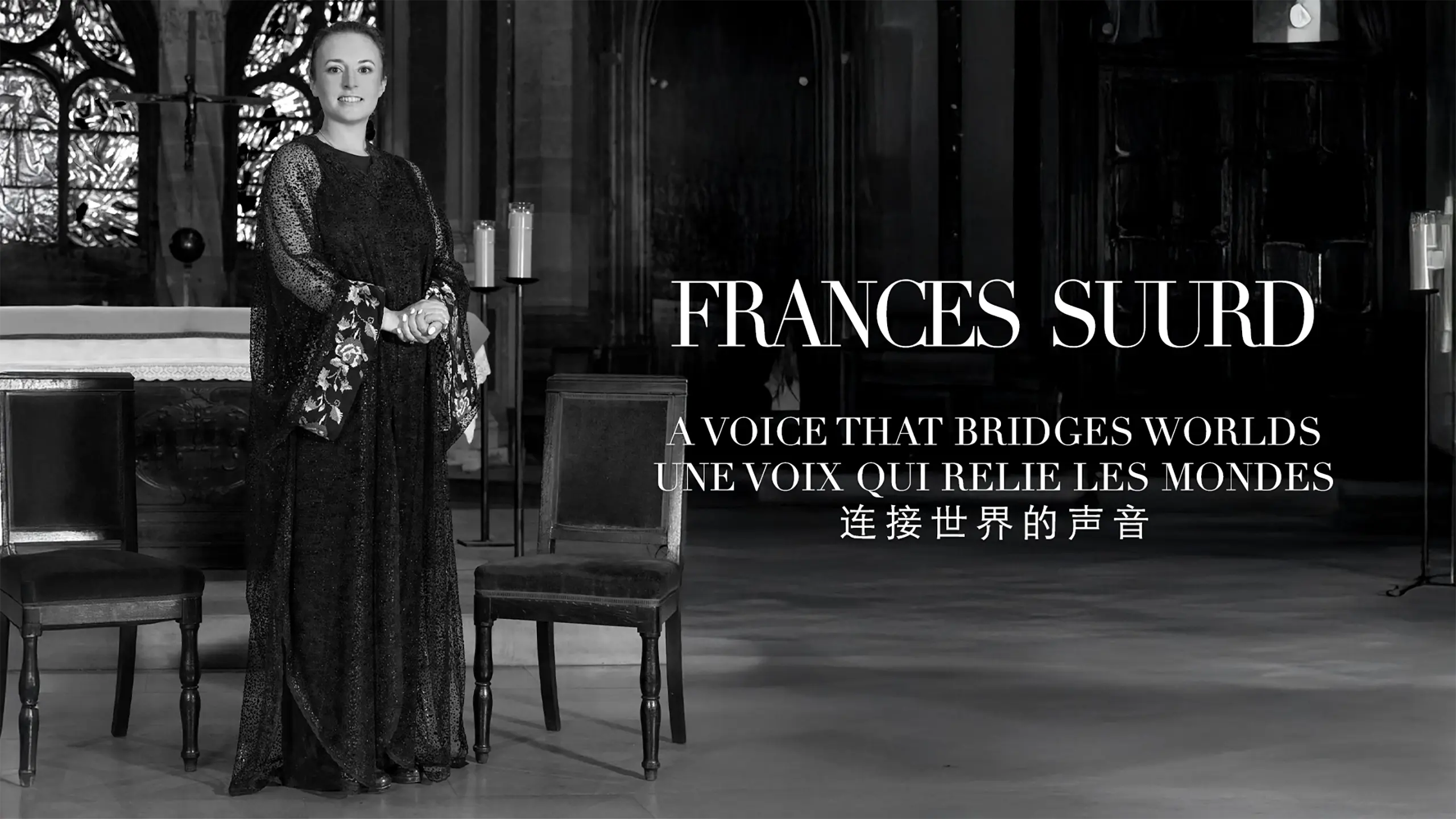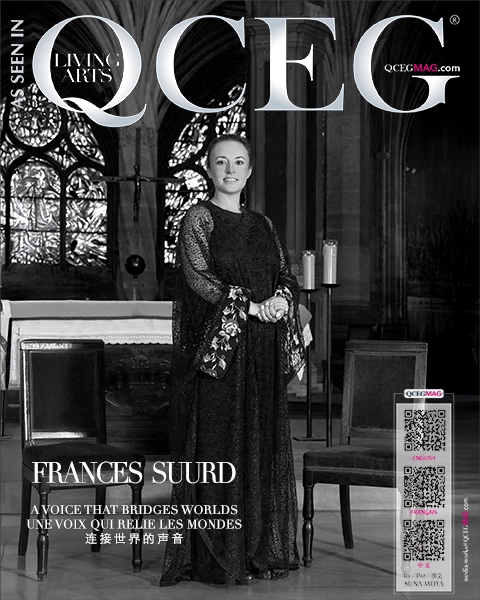

Editor-In-Chief
MeeKar Lim
International Fashion Editor
Suna Moya
Editor-At-Large
Zhang XiaoXiao

Please contact:
media-works@qcegmag.com
or
WeChat:QCEGMAG_Contact
QCEG MAG is a publication covering a selection of news in fashion, beauty, accessories, celebrities, LIVING ARTS, sports TRAVELS and relating videos around the world. Our portal is currently available in English and Chinese Languages for our international readers & viewers.
Get to know our professional team and their passionate creativity at QCEGPro.com




A VOICE THAT BRIDGES WORLDS
Soprano Frances Suurd’s Paris
performance bridges cultures and
generations with organ, oud,
and a voice of breathtaking grace.

Beneath the vaulted arches of St Séverin Church in Paris, soprano Frances Suurd sang with a voice that seemed to rise from the very stones. Paired with the organ and the oud — instruments rarely heard together — her singing created a bridge between continents, eras, and traditions. The result was both ancient and breathtakingly fresh, a testament to a performer who moves effortlessly between technical mastery and profound emotional truth.
Frances’s journey has been anything but conventional. Born in Halifax, raised in South Africa, trained across Europe and the United States, and now based in Dubai, she carries a tapestry of cultural influences in her voice. Each city, stage, and mentor has left its imprint: the elegance of European classical music, the rhythmic vitality of South Africa, the technical refinement of the United States, and the vibrant, centuries-deep musical colours of the Middle East. Together, these threads weave a soprano whose voice feels both universal and deeply personal.
Her path has also been marked by trials. A serious health challenge forced her from the stage, leaving her unable to sing for a time. Yet in that silence, Frances discovered resilience, patience, and a profound gratitude for her gift. She returned not merely with her voice restored but with a renewed understanding of music as a bridge — between self and audience, between cultures, and between the sacred and the human.
At St Séverin, every note Frances sang carried this philosophy. Moments such as the Panis Angelicus duet, performed in the centre of the church, and Carlo Massimo’s organ solo became more than music — they became shared experiences, where space, audience, and performers merged into one. Her collaborations with Fatima Al Hashmi, Marjan Ravandi, and Carlo Massimo brought unique brilliance to each performance, reminding us that true artistry is often collective, built on trust and imagination.
Whether interpreting Mozart, Rossini, Menotti or Bach, Frances balances precision with emotion, intellect with intuition. She approaches each phrase with intention, each character with honesty, and each performance with a sense of purpose that transforms the act of singing into an experience of connection and transcendence.
Beyond the stage, she teaches, mentors, and inspires — sharing her story of resilience and her philosophy of music as a universal language. Her vision is as expansive as her range: to continue exploring operatic roles, to perform monumental works such as Verdi’s Requiem, and to create concerts that celebrate both intimacy and shared humanity.
Our deepest thanks to Frances Suurd for opening her heart and her voice to us. Her artistry reminds us that music is not only an expression of beauty, but a force that unites, heals, and elevates — truly, a voice that bridges worlds.
— SUNA MOYA
Video Clips Editing By QCEG
FRANCES SUURD
A VOICE THAT BRIDGES WORLDS
Soprano Frances Suurd’s Paris performance bridges cultures and generations with organ, oud, and a voice of breathtaking grace.

Photography - NAHOKO SPIESS
(all black & white images, colour images N°1–4)
Suna Moya: In St Séverin Church, your voice was paired with the oud and the organ — two instruments not often heard together in traditional opera settings. Can you describe how it felt to experience this unusual fusion from the stage, and how it influenced your performance?
Frances Suurd: The organ, a familiar presence in sacred spaces, brought a majestic foundation to the evening — and in Carlo’s playing, every note seemed to breathe with intention. The oud, however, was a new and captivating partner. Its warm, earthy timbre and the delicate precision with which Marjan plays created something truly exquisite. Together, the oud and organ formed an unexpected yet seamless union, a meeting of Western and Middle Eastern traditions that felt both ancient and fresh. As a performer, it was easy to sing with these two instruments because of the beautiful blend they created.
Suna Moya: Which moments in the performance felt most alive for you — was it a particular aria, a musical exchange, or the energy from the audience? Can you share what made those moments so meaningful?
Frances Suurd: The most meaningful moments of the concert were during the Panis Angelicus duet and Carlo’s second organ solo. Ferrouze Gadery’s vision — uniting two continents by staging the duet in the middle of the church, with Fatima and me walking towards each other, and having Carlo sing while playing the organ — was simply brilliant. It added a striking visual element and a profound emotional depth. In those moments, the space, the audience, and the music merged into a single shared experience that will always remain special in my memory.
Suna Moya: Performing in a sacred, historic venue like St Séverin must come with unique challenges and inspirations. How does the space itself shape your singing and interpretation?
Frances Suurd: St Séverin’s beauty is undeniable — the dancing light through stained glass, the intricate beams telling the story of its history. But beyond its architecture, the church is a space of worship. That truth shaped everything for me. My focus wasn’t on performing for performance’s sake, but on offering my voice in praise and inviting others to join in that act of worship. Singing with complete honesty allowed the music to serve as a bridge between the sacred space, the audience, and the divine.
Suna Moya: What drew you to collaborate with Fatima Al Hashmi, Marjan Ravandi, and Carlo Massimo for this concert, and how did each artist contribute to the overall experience?
Frances Suurd: Ferrouze Gadery brought us together. Each artist brought a distinct brilliance: Fatima’s extraordinary voice, Marjan’s mastery of the oud, and Carlo’s remarkable organ artistry, especially at such a young age. The collaboration was a joy — the performance became greater than the sum of its parts, with each contribution celebrated and highlighted.
Suna Moya: You’ve performed across Europe, the U.S., and the Middle East. How have these diverse cultural landscapes shaped your musical identity?
Frances Suurd: Each place has left its imprint. Europe immersed me in Western classical elegance; South Africa gifted me rhythm and communal music-making; the U.S. refined my technique and expressive range; and the Middle East inspires me with vibrant colours, ornamentation, and centuries of tradition. Over time, these influences have woven themselves into my artistry, creating a musical identity that feels like a tapestry of all the people and places I’ve encountered
Suna Moya: Your path hasn’t been without challenges, including a period away from performing due to health reasons. How did that time affect your relationship with your voice and yourself?
Frances Suurd: Life presents challenges to all of us. Radiation and steroid treatment for a brain tumour left me unable to sing. I had to relearn slowly, often frustratingly, but intentionally. I had to learn to be kind to my voice, understanding it would only perform what it was ready for. That period taught me gratitude, resilience, and that I am more than my voice — determined, and deeply in love with music.
Suna Moya: Can you recall a performance that pushed you most as an artist and why?
Frances Suurd: In 2018, performing Bach’s St. John Passion with Umculo Opera in Soweto was transformative. The work was staged, not just performed, with local choirs and immersive choreography. The raw, human moments — like representing Jesus’s suffering with red paint — reminded me of the power of music and theatre to bring history and faith startlingly alive.
Suna Moya: How do you adapt your artistry to different performance spaces, from grand opera houses to intimate festival stages?
Frances Suurd: Technique remains constant — healthy breath, full-body engagement, clear tone — but artistry shifts. In a grand hall, I lean into resonance and breadth. In an intimate space, I connect personally, using subtler phrasing so the performance feels like it’s unfolding just for the audience in front of me.
Suna Moya: When preparing for a role or recital, do you start with technical precision or emotion?
Frances Suurd: Always with technique. It provides the foundation that allows genuine emotion to flow. Once pitch, rhythm, and phrasing are secure, I explore the emotional narrative — the climax, the emphasis, the journey of each phrase.
Suna Moya: Being based in Dubai, how does the city’s vibrant cultural landscape influence your work?
Frances Suurd: Dubai is diverse in ways that inspire endlessly. Music from every corner of the globe is present in one day. This cross-cultural richness opens my ears to new scales, rhythms, and traditions, reminding me that music is a universal language capable of connecting hearts across borders.
Suna Moya: Which composers feel most natural to your voice, and which challenge you in rewarding ways?
Frances Suurd: I aspire to roles like Gilda, Liu, and Mimi, each defined by love and vulnerability. I dream of performing Verdi’s Requiem, a work that combines monumental musical brilliance with spiritual depth. Ultimately, music is about sharing experiences, connection, and joy.
Suna Moya: For young singers who look up to you, what advice about resilience and artistry would you give?
Frances Suurd: Do not compare yourself to others. Each path is unique. Believe in yourself, and surround yourself with people who will support you through challenges and celebrate your successes. These are the voices that truly matter.
Suna Moya: For young singers who look up to you, what advice about resilience and artistry would you give?
Frances Suurd: Do not compare yourself to others. Each path is unique. Believe in yourself, and surround yourself with people who will support you through challenges and celebrate your successes. These are the voices that truly matter.